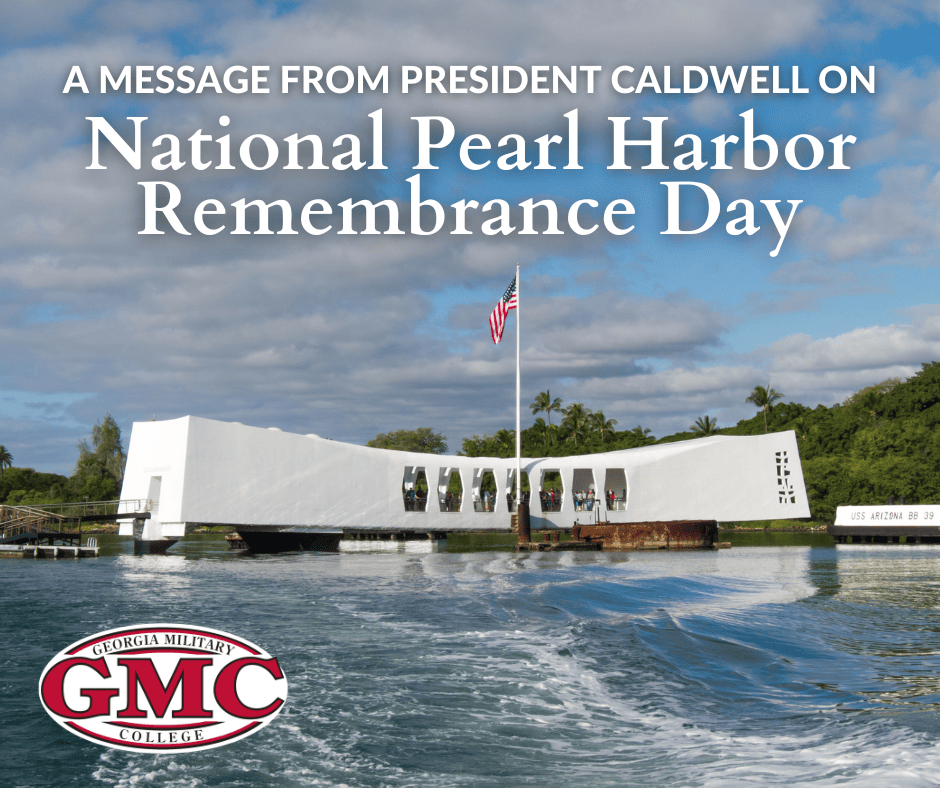GMC News
A Message from President Caldwell on Pearl Harbor Remembrance Day

A Message from President Caldwell on Pearl Harbor Remembrance Day
On the morning of December 7, 1941, Doris “Dorie” Miller, Mess Attendant 2nd Class, served breakfast to the men on the U.S.S. West Virginia having no idea that for many of the men, it would be their last meal. Doris joined the Navy because he wanted to serve his country at a time when it needed him most.
Unfortunately, at that time, Mess Attendant was one of the few opportunities available to black sailors.
Despite all that, when his fellow sailors needed him, MATT2 Miller went above and beyond the call of duty. He was elbows-deep in the ship’s laundry when the first explosion shook the ship. He found his mortally wounded Captain and pulled him to safety along with several other injured shipmates he happened upon. Then, once on deck, he strapped himself to a .50 caliber machine gun which he had never been trained to use, and shot down about half a dozen of the Japanese Zeros wreaking havoc from above. “It wasn’t hard,” he later said. “I just pulled the trigger, and she worked fine.”
The man who served the morning mess saved countless lives just a couple of hours later. Doris Miller received the Navy Cross for his heroism. Exactly two years later on December 7, 1943, Doris’s parents received word he was missing in action after the ship he was on, the Liscome Bay, was hit by a Japanese torpedo.
The “Patriotic Priest,” Father Aloysius H. Schmitt was the Catholic Chaplain on the U.S.S. Oklahoma. During the bombing on the morning of December 7, the Oklahoma was rolled, and hundreds of men were trapped below decks. Instead of escaping from the ship, Father Aloysius stayed onboard and helped other men escape the ship through a small porthole. He helped countless men escape the Oklahoma that morning, but he did not. His family received the Silver Star he was posthumously awarded at the Oklahoma Memorial on December 7, 2017.
BM1c Joseph George was confined to his quarters on the U.S.S. Vestal on the morning of December 7 and awaiting a court martial for fighting. When the Arizona was hit, he went up on deck and was ordered to cut the lines that moored the Vestal to the Arizona because the Arizona was sinking quickly and dragging the Vestal down with it.
He ignored the order long enough to toss a rope 70 feet to a sailor on the Arizona. Six men crossed hand-over-hand to the Vestal across the rope Joe had secured and thrown to them. Those six men were the only survivors from the forward section of the U.S.S. Arizona.
Doris, Father Schmitt, and Joe were the unlikeliest heroes that dark December morning, and it wasn’t race, rank, or social status that distinguished them that day. It was their character shaped by unshakable values held deep in their core. A commitment to duty, honor, and love of their country that was stronger than any instinct of self-preservation and a readiness to lead when the responsibility fell on them.
When I think about heroes like these and America’s long history of men and women who have sacrificed and placed themselves in harm’s way in the name of duty, honor, and country, I feel a deep sense of pride in the work we do every day at Georgia Military College. Anyone who has ever set foot on the campus has seen the banners here, that proudly display duty, honor, and country. And, Character above all! Every member of our GMC family is on a daily mission to instill those same core values in our students.
We create a new generation of leaders here, and we make sure that they are deeply committed to duty, honor, and love of our country because we know that any man or woman who goes above and beyond the call of duty doesn’t suddenly develop character and values when a crisis presents itself. It’s already deep inside them waiting for the opportunity, when it is most needed, to be revealed.

